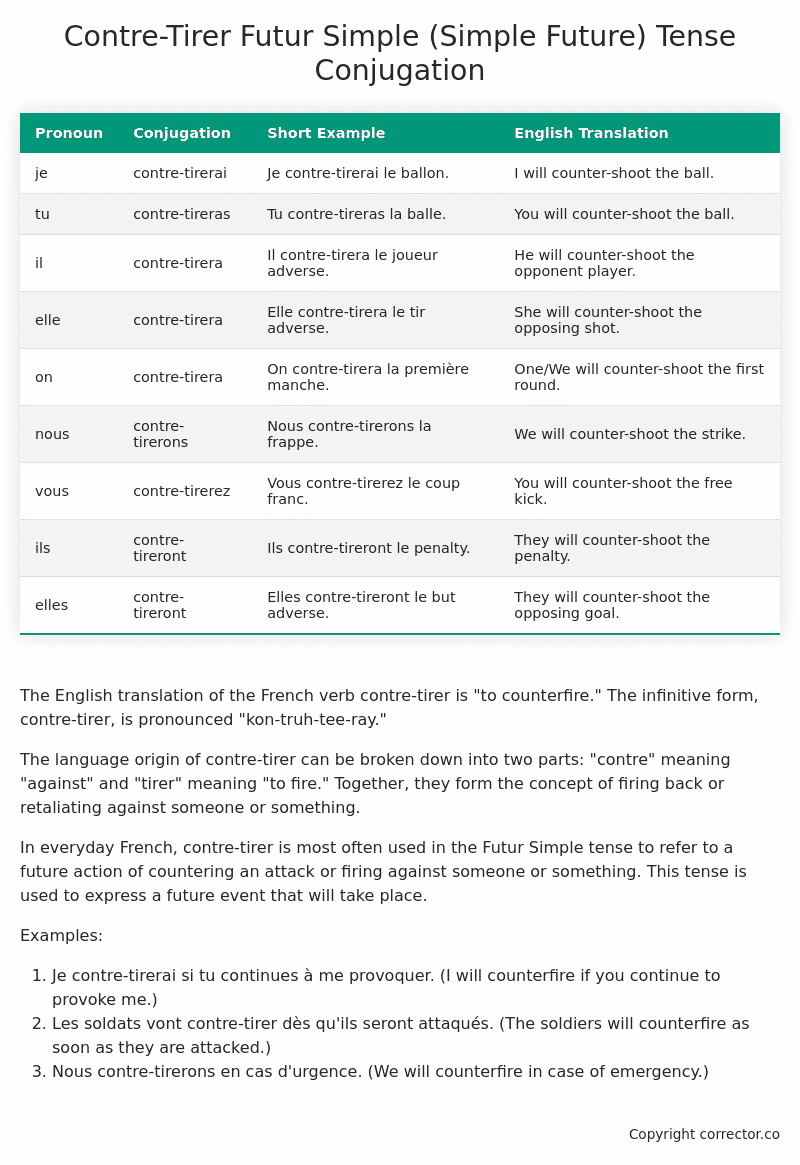Futur Simple (Simple Future) Tense Conjugation of the French Verb contre-tirer
Introduction to the verb contre-tirer
The English translation of the French verb contre-tirer is “to counterfire.” The infinitive form, contre-tirer, is pronounced “kon-truh-tee-ray.”
The language origin of contre-tirer can be broken down into two parts: “contre” meaning “against” and “tirer” meaning “to fire.” Together, they form the concept of firing back or retaliating against someone or something.
In everyday French, contre-tirer is most often used in the Futur Simple tense to refer to a future action of countering an attack or firing against someone or something. This tense is used to express a future event that will take place.
Examples:
- Je contre-tirerai si tu continues à me provoquer. (I will counterfire if you continue to provoke me.)
- Les soldats vont contre-tirer dès qu’ils seront attaqués. (The soldiers will counterfire as soon as they are attacked.)
- Nous contre-tirerons en cas d’urgence. (We will counterfire in case of emergency.)
Table of the Futur Simple (Simple Future) Tense Conjugation of contre-tirer
| Pronoun | Conjugation | Short Example | English Translation |
|---|---|---|---|
| je | contre-tirerai | Je contre-tirerai le ballon. | I will counter-shoot the ball. |
| tu | contre-tireras | Tu contre-tireras la balle. | You will counter-shoot the ball. |
| il | contre-tirera | Il contre-tirera le joueur adverse. | He will counter-shoot the opponent player. |
| elle | contre-tirera | Elle contre-tirera le tir adverse. | She will counter-shoot the opposing shot. |
| on | contre-tirera | On contre-tirera la première manche. | One/We will counter-shoot the first round. |
| nous | contre-tirerons | Nous contre-tirerons la frappe. | We will counter-shoot the strike. |
| vous | contre-tirerez | Vous contre-tirerez le coup franc. | You will counter-shoot the free kick. |
| ils | contre-tireront | Ils contre-tireront le penalty. | They will counter-shoot the penalty. |
| elles | contre-tireront | Elles contre-tireront le but adverse. | They will counter-shoot the opposing goal. |
Other Conjugations for Contre-Tirer.
Le Present (Present Tense) Conjugation of the French Verb contre-tirer
Imparfait (Imperfect) Tense Conjugation of the French Verb contre-tirer
Passé Simple (Simple Past) Tense Conjugation of the French Verb contre-tirer
Passé Composé (Present Perfect) Tense Conjugation of the French Verb contre-tirer
Futur Simple (Simple Future) Tense Conjugation of the French Verb contre-tirer (this article)
Futur Proche (Near Future) Tense Conjugation of the French Verb contre-tirer
Plus-que-parfait (Pluperfect) Tense Conjugation of the French Verb contre-tirer
Passé Antérieur (Past Anterior) Tense Conjugation of the French Verb contre-tirer
Futur Antérieur (Future Anterior) Tense Conjugation of the French Verb contre-tirer
Subjonctif Présent (Subjunctive Present) Tense Conjugation of the French Verb contre-tirer
Subjonctif Passé (Subjunctive Past) Tense Conjugation of the French Verb contre-tirer
Subjonctif Imparfait (Subjunctive Imperfect) Tense Conjugation of the French Verb contre-tirer
Conditionnel Présent (Conditional Present) Tense Conjugation of the French Verb contre-tirer
Conditionnel Passé (Conditional Past) Tense Conjugation of the French Verb contre-tirer
L’impératif Présent (Imperative Present) Tense Conjugation of the French Verb contre-tirer
L’infinitif Présent (Infinitive Present) Tense Conjugation of the French Verb contre-tirer
Struggling with French verbs or the language in general? Why not use our free French Grammar Checker – no registration required!
Get a FREE Download Study Sheet of this Conjugation 🔥
Simply right click the image below, click “save image” and get your free reference for the contre-tirer Futur Simple tense conjugation!

Contre-Tirer – About the French Futur Simple (Simple Future) Tense
Formation of Futur Simple
For regular -er verbs (e.g., parler – to speak)
For regular -ir verbs (e.g., finir – to finish)
For regular -re verbs (e.g., vendre – to sell)
Common Everyday Usage Patterns
Conditional Statements
Interactions with Other Tenses
Futur Antérieur
Conditional
Present
Summary
I hope you enjoyed this article on the verb contre-tirer. Still in a learning mood? Check out another TOTALLY random French verb conjugation!


